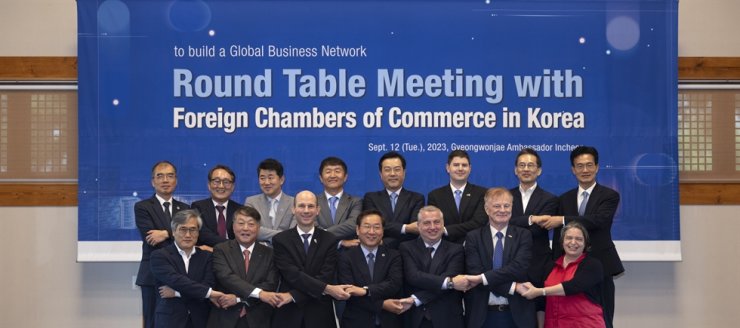
 >
>
>
>
2023.09.15
Incheon urged to maximize potential to replace Hong Kong

Port city needs to foster renewable energy to attract foreign investments
By Park Jae-hyuk, The Korea Times - Incheon should take
advantage of its location suitable for supplying renewable energies, as well as
its status as the gateway for international interactions, to achieve its goal
of becoming a global business hub replacing Hong Kong, according to foreign
chambers of commerce in Korea, Tuesday.
During a roundtable meeting on ways for the coastal
city to attract more overseas investment, foreign chamber executives called for
the supply of green energy, eased regulations and more use of the English
language.
Korean-German Chamber of Commerce and Industry (KGCCI)
President Martin Henkelmann, who mentioned the origins of the two countries'
diplomatic ties dating back 140 years in Incheon's port of Jemulpo, said it is
important for German firms to have access to renewable energy.
"They want to be sure that they get green energy
to prepare for their RE100 goals," Henkelmann said, recognizing Incheon
for its efforts to transform into a green industry-focused city.
European Chamber of Commerce in Korea (ECCK) Energy
& Environment Committee Chairman Moon Go-young emphasized Incheon's unique
and attractive location for renewable energy suppliers.
As the co-CEO of the Korean subsidiary of RWE,
Germany's largest power company, he expressed his company's interest in
offshore wind power generation for foreign companies in the city.
"ECCK Chairman Philippe Van Hoof is interested in
European companies playing in Incheon's energy sector," Moon said.
"If we use Incheon sea area to generate renewable electricity, it means a
lot to global companies to be located in Incheon."
Predictable regulations, tax incentives
French Korean Chamber of Commerce and Industry (FKCCI)
Chairman David-Pierre Jalicon, who also expects a French company to build an
offshore wind power plant in Incheon, asked for predictable and consistent
regulations, regardless of jurisdiction.
"Regulations should be stable, and there should be
no gray area," Jalicon said.
In addition, he wanted eased visa rules for French
students in Korea, who are fluent in the Korean language and familiar with
Korean culture, to avoid difficulties in getting jobs here.
The KGCCI president also shared parts of the FKCCI
chairman's opinions, given that German companies are looking for countries
having "very eased regulations" as their next investment destinations
in Asia.
Giancarlo Grosso, director of Strategy & Business
Planning at the American Chamber of Commerce in Korea (AMCHAM), which has
sought to make Korea a regional headquarters in Asia, suggested Incheon
streamline its administrative procedures, so as to be more efficient and
attractive.
He also talked about offering incentive packages, for
the Korean city to compete with other Asian financial hubs such as Japan, Hong
Kong and Singapore.
"This could involve providing corporate tax
incentives, grants and subsidies," Grosso said.
Incheon Mayor Yoo Jeong-bok said that the city
government has talked with the central government to ease regulations further
by revising the Special Act on Designation and Management of Free Economic
Zones.
"Although the Incheon Free Economic Zone has been
more favorable than other regions in terms of administrative procedures and
various financial incentives, I admit there needs to be more benefits,"
Yoo said. "The city government will streamline administrative procedures
as much as possible."
Kim Tae-hyung, commissioner of Invest KOREA, a national
investment promotion agency established as part of the Korea Trade-Investment
Promotion Agency (KOTRA), said that President Yoon Suk Yeol and the central
government have also stepped up efforts to tackle the challenges.
Overcoming language barriers
Korea's use of English as a foreign language, instead
of the official language, was mentioned as another obstacle to Incheon's goal
during the discussion session, which also provided simultaneous interpretation.
"The reason why German investment goes to Hong
Kong and Singapore is their English-speaking people," the KGCCI president
said. "The language is so important for foreigners to come."
British Chamber of Commerce in Korea (BCCK) Executive
Director Lucinda Walker agreed that the inconvenience in using English has
partially caused difficulties in attracting foreign investors to Korea,
although she recognized Incheon for making efforts to change that.
She hoped for Incheon to accommodate British companies,
as well as schools and universities from the U.K., as they are interested in
coming to the city, which hosts five foreign university campuses and three
international schools.
As one of the two female participants among the 16
discussants, the BCCK executive director also emphasized the importance of
diversity, anticipating more Korean women will play major roles in workplaces.
Finland Chamber of Commerce and Industry Chairman
Heikki Ranta said Korea has been more strategically important for Finland,
which joined the North Atlantic Treaty Organization (NATO) recently, amid the
growing geopolitical risks in Europe and Asia.
He advised Incheon to seek cooperation with startups in
his country.
"We have a potential of technology startups,"
Ranta said, mentioning that Finland has hundreds of startups founded by people
laid off from Nokia.
Korea Chamber of Commerce and Industry Executive
Director Park Che-khun suggested Incheon attract medical tourists by taking
advantage of the city's reputation as a biopharmaceutical industry hub and
local branches of Severance Hospital and Asan Medical Center there.
"It is also important for Incheon to be an
attractive city for Koreans, especially younger generations," he said.
"For the city to be attractive to young people, it needs competitiveness
in culture and art."
The Incheon mayor promised efforts to satisfy the
demands of the roundtable participants.
"Thank you for your constructive opinions,"
he said. "Incheon will definitely become an international city
representing Korea."
The Korea Times President-Publisher Oh Young-jin, who
moderated the discussion, said that the globalization of Incheon is important
not just for the city, but also for Korea and the world.
Source: https://www.koreatimes.co.kr/www/tech/2023/09/419_359092.html